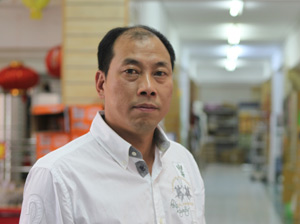Bleak times for Chinese businessmen in Athens
Updated: 2012-06-16 08:01
By Fu Jing in Athens (China Daily)
|
|||||||||||
Wu Hailong is one of many Athens-based Chinese businessmen losing confidence in Greece.
"We are waiting, waiting and waiting for a change for the better in this country," said the 47-year-old. "But we are challenged by the political impasse, the worsening business climate and social disorder."
As one of the most successful Chinese businessmen in Athens, Wu said he had confidence in Greece before last year. But as Sunday's parliamentary election approaches, Wu said he had lost hope in Greece's politicians.
"I cannot see any light at the end of tunnel right now," said Wu, the owner of a company that trades in Chinese commodities and publisher of the Chinese-language Euro Weekly newspaper.
"But all business is very bad and difficult," said Wu, from Qingtian, a city in Zhejiang province that is famous for its long tradition of local people moving abroad to start businesses.

In 2009, he handled more than 100 containers of goods imported from China, while the number fell to 40 in 2010, and 20 last year.
"And in the first half of this year, I imported just seven containers of clothes and other commodities," said Wu.
In the eight-floor Chinatown building which he rents and operates, he uses the third floor, which covers 700 square meters, as wholesale store. But it is very difficult for his staff to make business deals.
Around his Chinatown building, about 200 Chinese shops have opened next to each other, but now shoppers are few and the shopkeepers and their employees have glum expressions.
According to Wu, who started his business in Athens in 2001 after leaving his hometown, there are several reasons for the bleak business outlook.
He said that the austerity policies in Greece since 2010 have weakened the spending ability of the medium- and low-income Greek families, and most of them have frozen their spending on clothing and shoes.
At the same time, the Greek government has increased the business tax.
In China, export prices have increased due to inflation and higher labor costs. "With all these factors, you can see how hard our business is," said Wu.
"The fluctuation of the euro is also a difficulty for us," he added.
His publishing business has also been affected since the government increased the newspaper postage rate by one euro last year.
This means that although the Euro Weekly's circulation has fallen, its costs have risen dramatically, he said.
Wu also said the austerity has lead to a rise in crimes such as theft and robbery. "Chinese people have usually become their targets," said Wu, adding that Chinese people in Athens are even afraid of walking alone on the streets.
Amid such difficulties, uncertainties and even danger, many Chinese have decided to leave.
He said that one-fifth of Athens' 20,000 Chinese businessmen and their employees have already returned to China.
Around his Chinatown building, the number of Chinese shops has reduced from 300 to around 200 recently. Even in his building, more than a quarter of the businesses have closed since last year.
Wu recalled that Chinese business experienced a "golden decade" in Athens from 1998 to 2008.
And after it joined the eurozone in 2002, Greece attracted a large number of Chinese to start businesses there.
In 2001, Wu decided to move to Europe because some of his relatives have already become quite successful in Spain, France, Italy and Austria.
"I chose to settle down in Athens because at that time, not so many Chinese were here," he said, admitting that he made easy money before 2008.
Although the economic crisis has dented his confidence and passion, Wu does not plan to leave Greece.
Should the country leave the eurozone, he doesn't think it will have too much of an effect on Chinese businessmen in Greece.
"Many Chinese businessmen don't have too many euros in their accounts in Greece," Wu said.
Tan Xuan contributed to this story.
fujing@chinadaily.com.cn
Today's Top News
President Xi confident in recovery from quake
H7N9 update: 104 cases, 21 deaths
Telecom workers restore links
Coal mine blast kills 18 in Jilin
Intl scholarship puts China on the map
More bird flu patients discharged
Gold loses sheen, but still a safe bet
US 'turns blind eye to human rights'
Hot Topics
Lunar probe , China growth forecasts, Emission rules get tougher, China seen through 'colored lens', International board,
Editor's Picks

|

|

|

|

|

|





